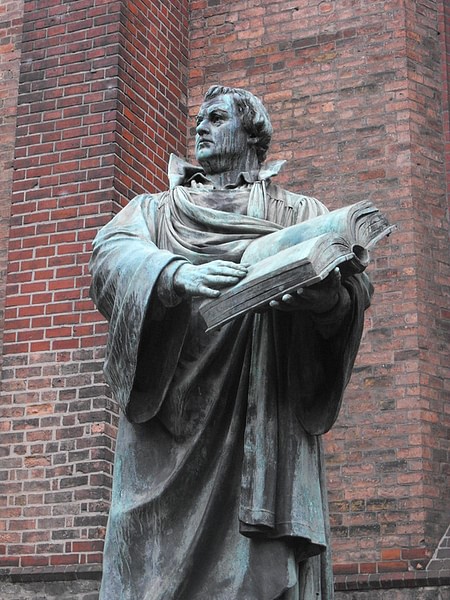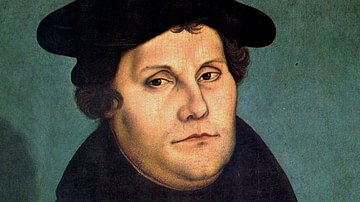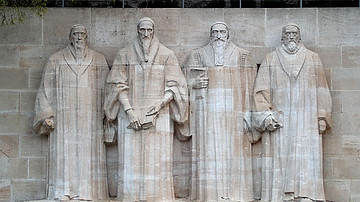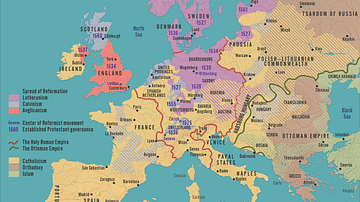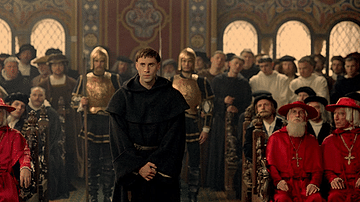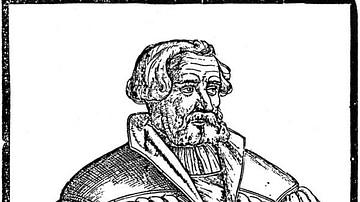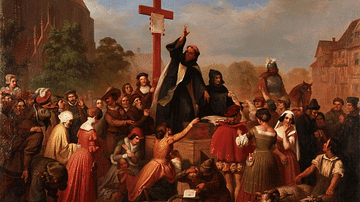Martin Luther's 95 Theses, credited with sparking the Protestant Reformation in Europe, have become a cultural touchstone since he posted them 31 October 1517, but the little-known 97 Theses, posted only a month earlier, are equally significant in the development of Luther's (l. 1483-1546) vision and theology.
The 97 Theses are a series of disputations written to invite debate on the topic of scholastic theology and are also referred to as his Disputation Against Scholastic Theology. Scholastic theology was the accepted method of interpreting scripture and defining the nature of humanity in relation to God as well as the attributes of the divine itself.
This theological system was drawn from Aristotle (l. 384-322 BCE) and established by the Church Father Thomas Aquinas (l. 1225-1274) following the precepts and example of Saint Augustine of Hippo (l. 354-430). Aquinas' translation and use of Aristotle inspired the scholastic tradition in the medieval Church which was still central to the training of the clergy in Luther's time.
Rejection of Scholastic Theology
Although Luther was originally drawn to the works of Aristotle and those of the great medieval scholastic theologians, he began to feel they confused matters far more than they clarified. Once Luther became convinced that humans were justified by faith alone, and could do nothing to earn God's grace, he rejected scholasticism as a means toward knowledge of God and emphasized prayerful reading of the Bible as one's direct route toward communion with the divine.
The 97 Theses present Luther's theology based on the precepts of scripture alone and faith alone as the means of knowing God's will while dismissing the scholastic tradition as counterproductive and even unbiblical. The scholars he cites below in his arguments – William of Ockham (l. c. 1287-1347), Duns Scotus (l. c. 1265-1308), and Gabriel Biel (l. c. 1425-1495) – were among the most highly regarded scholastic theologians of their times who had helped shape church doctrine and vision.
The works of Aristotle, which formed the basis of the Catholic Church's theological approach, were understood by the Church as essential in developing a sound, rational theology, and these were required reading for any clergy. In taking issue with the works of these men, Luther was challenging church policy, but his careful phrasing kept his critiques soundly within the confines of the very system he was arguing against.
Scholar Lyndal Roper expresses the opinion of most modern-day scholars that the 97 Theses "are in many ways more radical and shocking than the Ninety-Five Theses" (81) in that the latter took aim at the church policy of selling indulgences and the authority of the pope while the former is an attack on the whole theological system of the Church including the concept of free will. Roper continues:
The theses are an extraordinarily confident set of propositions, which are ordered as though they follow from one another, but their sequence is emotional as much as logical. Briskly, Luther labels one after another of his statements as "contrary to common opinion" or "in opposition to the scholastics." They capture his rejection of the whole tradition of medieval theology in all its passionate fury as he concludes: "No one can become a theologian unless he becomes one without Aristotle." (81)
His rejection of Aristotelian logic is not a rejection of reason, however, nor of rational discourse. Luther had simply come to realize that one cannot rely on human reason to apprehend the divine. His revelation upon reading the line from Romans 1:17 – "the just shall live by faith” – convinced him that God provided humanity with the grace to know God's will and no system devised by humans could improve upon that.

The 97 Theses
The following comes from Martin Luther's Basic Theological Writings, edited by Timothy F. Lull and William R. Russell, pp. 3-7. They are presented without commentary:
1. To say that Augustine exaggerates in speaking against heretics is to say that Augustine tells lies almost everywhere. This is contrary to common knowledge.
2. This is the same as permitting Pelagians and all heretics to triumph, indeed, the same as conceding victory to them.
3. It is the same as making sport of the authority of all doctors of theology.
4. It is therefore true that man, being a bad tree, can only will and do evil [Cf. Matt. 7:17-18].
5. It is false to state that man's inclination is free to choose between either of two opposites. Indeed, the inclination is not free, but captive. Tiffs is said in opposition to common opinion.
6. It is false to state that the will can by nature conform to correct precept. This is said in opposition to Scotus and Gabriel.
7. As a matter of fact, without the grace of God the will produces an act that is perverse and evil.
8. It does not, however, follow that the will is by nature evil, that is, essentially evil, as the Manichaeans maintain.
9. It is nevertheless innately and inevitably evil and corrupt.
10. One must concede that the will is not free to strive toward whatever is declared good. This in opposition to Scotus and Gabriel.
11. Nor is it able to will or not to will whatever is prescribed.
12. Nor does one contradict St. Augustine when one says that nothing is so much in the power of the will as the will itself.
13. It is absurd to conclude that erring man can love the creature above all things, therefore also God. This in opposition to Scotus and Gabriel.
14. Nor is it surprising that the will can conform to erroneous and not to correct precept.
15. Indeed, it is peculiar to it that it can only conform to erroneous and not to correct precept.
16. One ought rather to conclude: since erring man is able to love the creature it is impossible for him to love God.
17. Man is by nature unable to want God to be God. Indeed, he himself wants to be God, and does not want God to be God.
18. To love God above all things by nature is a fictitious term, a chimera, as it were. This is contrary to common teaching.
19. Nor can we apply the reasoning of Scotus concerning the brave citizen who loves his country more than himself.
20. An act of friendship is done, not according to nature, but according to prevenient grace. This in opposition to Gabriel.
21. No act is done according to nature that is not an act of concupiscence against God.
22. Every act of concupiscence against God is evil and a fornication of the spirit.
23. Nor is it true that an act of concupiscence can be set aright by the virtue of hope. This in opposition to Gabriel.
24. For hope is not contrary to charity, which seeks and desires only that which is of God.
25. Hope does not grow out of merits, but out of suffering which destroys merits. This in opposition to the opinion of many.
26. An act of friendship is not the most perfect means for accomplishing that which is in one. Nor is it the most perfect means for obtaining the grace of God or turning toward and approaching God.
27. But it is an act of conversion already perfected, following grace both in time and by nature.
28. If it is said of the Scripture passages, "Return to me,…and I will return to you" [Zechariah 1:3], "Draw near to God and he will draw near to you" [James 4:8], "Seek and you will find" [Matthew 7:7], "You will seek me and find me" [Jeremiah 29:13], and the like, that one is by nature, the other by grace, this is no different from asserting what the Pelagians have said.
29. The best and infallible preparation for grace and the sole disposition toward grace is the eternal election and predestination of God.
30. On the part of man, however, nothing precedes grace except indisposition and even rebellion against grace.
31. It is said with the idlest demonstrations that the predestined can be damned individually but not collectively. This in opposition to the scholastics.
32. Moreover, nothing is achieved by the following saying: Predestination is necessary by virtue of the consequence of God's willing, but not of what actually followed, namely, that God had to elect a certain person.
33. And this is false, that doing all that one is able to do can remove the obstacles to grace. This in opposition to several authorities.
34. In brief, man by nature has neither correct precept nor good will.
35. It is not true that an invincible ignorance excuses one completely (all scholastics notwithstanding);
36. For ignorance of God and oneself and good work is always invincible to nature.
37. Nature, moreover, inwardly and necessarily glories and takes pride in every work which is apparently and outwardly good.
38. There is no moral virtue without either pride or sorrow, that is, without sin.
39. We are not masters of our actions, from beginning to end, but servants. This in opposition to the philosophers.
40. We do not become righteous by doing righteous deeds but, having been made righteous, we do righteous deeds. This in opposition to the philosophers.
41. Virtually the entire Ethics of Aristotle is the worst enemy of grace. This in opposition to the scholastics.
42. It is an error to maintain that Aristotle's statement concerning happiness does not contradict Catholic doctrine. This in opposition to the doctrine on morals.
43. It is an error to say that no man can become a theologian without Aristotle. This in opposition to common opinion.
44. Indeed, no one can become a theologian unless he becomes one without Aristotle.
45. To state that a theologian who is not a logician is a monstrous heretic—this is a monstrous and heretical statement. This in opposition to common opinion.
46. In vain does one fashion a logic of faith, a substitution brought about without regard for limit and measure. This in opposition to the new dialecticians.
47. No syllogistic form is valid when applied to divine terms. This in opposition to the Cardinal.
48. Nevertheless, it does not for that reason follow that the truth of the doctrine of the Trinity contradicts syllogistic forms. This in opposition to the same new dialecticians and to the Cardinal.
49. If a syllogistic form of reasoning holds in divine matters, then the doctrine of the Trinity is demonstrable and not the object of faith.
50. Briefly, the whole Aristotle is to theology as darkness is to light. This in opposition to the scholastics.
51. It is very doubtful whether the Latins comprehended the correct meaning of Aristotle.
52. It would have been better for the church if Porphyry with his universals had not been born for the use of theologians.
53. Even the more useful definitions of Aristotle seem to beg the question.
54. For an act to be meritorious, either the presence of grace is sufficient, or its presence means nothing. This in opposition to Gabriel.
55. The grace of God is never present in such a way that it is inactive, but it is a living, active, and operative spirit; nor can it happen that through the absolute power of God an act of friendship may be present without the presence of the grace of God. This in opposition to Gabriel.
56. It is not true that God can accept man without his justifying grace. This in opposition to Ockham.
57. It is dangerous to say that the law commands that an act of obeying the commandment be done in the grace of God. This in opposition to the Cardinal and Gabriel.
58. From this it would follow that "to have the grace of God" is actually a new demand going beyond the law.
59. It would also follow that fulfilling the law can take place without the grace of God.
60. Likewise it follows that the grace of God would be more hateful than the law itself.
61. It does not follow that the law should be complied with and fulfilled in the grace of God. This in opposition to Gabriel.
62. And that therefore he who is outside the grace of God sins incessantly, even when he does not kill, commit adultery, or become angry.
63. But it follows that he sins because he does not spiritually fulfill the law.
64. Spiritually that person does not kill, does not do evil, does not become enraged when he neither becomes angry nor lusts.
65. Outside the grace of God it is indeed impossible not to become angry or lust, so that not even in grace is it possible to fulfill the law perfectly.
66. It is the righteousness of the hypocrite actually and outwardly not to kill, do evil, etc.
67. It is by the grace of God that one does not lust or become enraged.
68. Therefore it is impossible to fulfill the law in any way without the grace of God.
69. As a matter of fact, it is more accurate to say that the law is destroyed by nature without the grace of God.
70. A good law will of necessity be bad for the natural will.
71. Law and will are two implacable foes without the grace of God.
72. What the law wants, the will never wants, unless it pretends to want it out of fear or love.
73. The law, as taskmaster of the will, will not be overcome except by the "child, who has been born to us" [Isaiah 9:6].
74. The law makes sin abound because it irritates and repels the will [Romans 7:13].
75. The grace of God, however, makes justice abound through Jesus Christ because it causes one to be pleased with the law.
76. Every deed of the law without the grace of God appears good outwardly, but inwardly it is sin. This in opposition to the scholastics.
77. The will is always averse to, and the hands inclined toward, the law of the Lord without the grace of God.
78. The will which is inclined toward the law without the grace of God is so inclined by reason of its own advantage.
79. Condemned are all those who do the works of the law.
80. Blessed are all those who do the works of the grace of God.
81. Chapter Falsas concerning penance, dist. 5, 10 confirms the fact that works outside the realm of grace are not good, if this is not understood falsely.
82. Not only are the religious ceremonials not the good law and the precepts in which one does not live (in opposition to many teachers).
83. But even the Decalogue itself and all that can be taught and prescribed inwardly and outwardly is not good law either.
84. The good law and that in which one lives is the love of God, spread abroad in our hearts by the Holy Spirit.
85. Anyone's will would prefer, if it were possible, that there would be no law and to be entirely free.
86. Anyone's will hates it that the law should be imposed upon it; if, however, the will desires imposition of the law it does so out of love of self.
87. Since the law is good, the will, which is hostile to it, cannot be good.
88. And from this it is clear that everyone's natural will is iniquitous and bad.
89. Grace as a mediator is necessary to reconcile the law with the will.
90. The grace of God is given for the purpose of directing the will, lest it err even in loving God. In opposition to Gabriel.
91. It is not given so that good deeds might be induced more frequently and readily, but because without it no act of love is performed. In opposition to Gabriel.
92. It cannot be denied that love is superfluous if man is by nature able to do an act of friendship. In opposition to Gabriel.
93. There is a kind of subtle evil in the argument that an act is at the same time the fruit and the use of the fruit. In opposition to Ockham, the Cardinal, Gabriel.
94. This holds true also of the saying that the love of God may continue alongside an intense love of the creature.
95. To love God is at the same time to hate oneself and to know nothing but God.
96. We must make our will conform in every respect to the will of God (in opposition to the Cardinal).
97. So that we not only will what God wills, but also ought to will whatever God wills.
In these statements we wanted to say and believe we have said nothing that is not in agreement with the Catholic church and the teachers of the church.
[year] 1517
